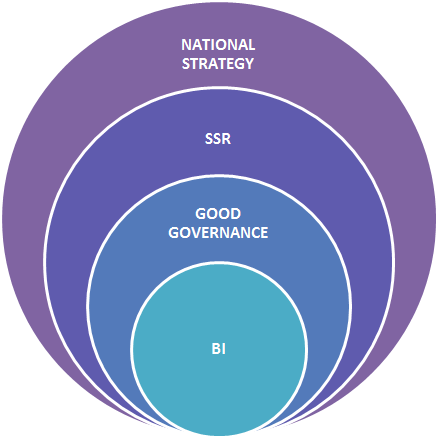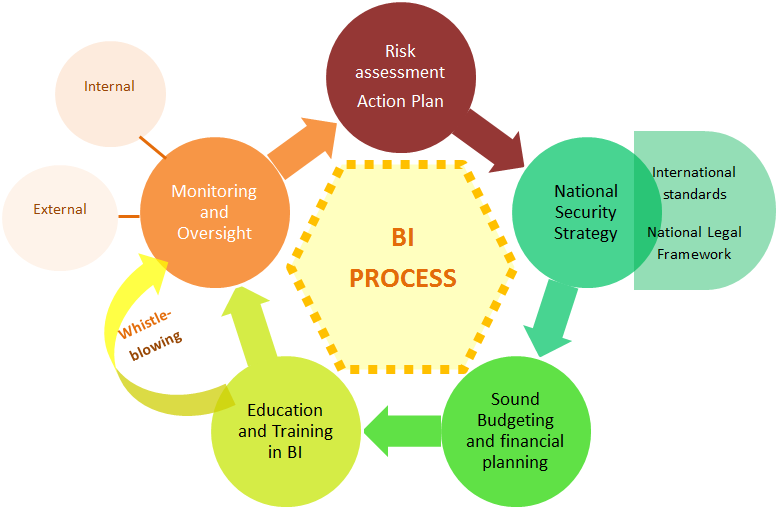Integrity means meeting one’s responsibilities honestly and completely. A process has integrity if it works as it is intended to and fits into the larger system of which it is part. An organisation has integrity if its activities are conducted with proper accountability and competence, without any diversion of resources to dishonest, private needs. An individual has integrity if he/she is doing their work competently, honestly and completely. Integrity is usually measured through audits and surveys.
What is Building Integrity?
Building Integrity (BI) is the vital component of Good Governance strategies, which lie at the heart of Security Sector Reform. Security Sector Reform (SSR) is a political and technical process of reform which seeks to improve the function of the security sector. NATO is one of the main organisations leading the way in BI efforts today with their BI Programme, a capacity-building programme that provides practical tools to help nations strengthen integrity, transparency, and accountability and reduce the risk of corruption in the defence and security sectors.
Why is it important?
Corruption acts as a significant obstacle to development, security, and stability of modern societies. It decreases trust in public institutions and undermines the effectiveness of the armed forces. Security sector corruption extorts a high price from other sectors of public life. It diverts funds from the national budget, preventing investment in education, healthcare, innovation, and development. Corruption also reduces operational effectiveness of the military and undermines national defence capacity.
How does it work?
BI programmes are, usually, part of a wider Security Sector Reform. Additionally, SSR is meant to accompany a broader and more comprehensive effort – on a national level – towards Good Governance and countering corruption. There are a number of steps and tools for building integrity in the security sector. Successful BI programmes strive to be as comprehensive as possible, all the while, remaining realistic and setting attainable objectives adapted to a particular context.
- Risk Assessment and Action Plan
The first step towards BI is identifying and assessing corruption risks and developing a plan/strategy to cope with them. Tools for assessing and planning are available to Governments and Security sector personnel, such as NATO-DCAF Integrity Self-Assessment Process and CIDS-TI Integrity Action Plan.
- Comprehensive Legal Framework
An essential component of BI is an adequate regulatory and legal framework, in addition to the existence of Codes of Conduct and Ethical Guidelines.
- Sound Budgeting and Financial Planning
Great attention must be paid to Budgeting and financial planning. Latter ought to be developed in line with the overall National Security Strategy and within a medium to long-term timeframe.
- Training and Education
Education plays a crucial role across all levels of the security sector hierarchy. Therefore, a thorough focus on training of the military and civilian personnel of the security sector in BI matters is needed. There are a number of BI programmes and Courses developed by NATO, DCAF, CIDS, Defence Academy of UK, and other organisations and establishments available to military and civilian personnel.
- Monitoring and Oversight
In order to guarantee the success of BI efforts over time, an Oversight Framework must be established. This may involve internal and external oversight mechanisms that consist of: inspectors, oversight committees, auditors and ombudsman. Parliamentarians and the Government play essential roles in this process. Civil society and the media ought to have access to information and freedom to scrutinise the security sector, in order to establish a healthy checks-and-balances environment that discourages corruption.
Who is involved in Building Integrity Process?
Since Building Integrity is a holistic process, it encompasses a wide range of actors. On a national level, a BI programme is developed by the Government with the help of other concerned parties (Parliament, Ministries, Committees, etc.) and is inscribed within the National (Security) Strategy framework. The programme is implemented by the military and civilian personnel, and overseen by the Parliament, civil society, and other oversight institutions. National legislation provides the groundwork for this process. On an international level, international organisations offer training, guidance, and external oversight. Other states provide best practices and examples. Finally, international legal standards frame the overall process.
Sources
Centre for Integrity in the Defence Sector. Criteria for good governance in the defence sector. International standards and principles (2015)
Centre for Integrity in the Defence Sector. Integrity Action Plan. A handbook for practitioners in defence establishments (2014)
CIDS (2015) Guides to Good Governance: Professionalism and integrity in the public service. No 1.
Centre for Integrity in the Defence Sector: Guides to Good Governance
DCAF(2009), Backgrounder. Security Sector Governance and Reform. See new Backgrounder series here.
DCAF (2015), Parliamentary Brief: Building integrity in Defence.
DCAF – UNDP (2008) Public Oversight of the Security Sector. A handbook for civil society organizations.
DCAF, (2012), Guidebook: Strengthening Financial Oversight in the Security Sector.
DCAF (2012), Ombuds Institutions for the Armed Forces: a Handbook.
DCAF Project: Ombuds Institutions for Armed Forces, List of publications.
IMF (2007) Code of Good Practices on fiscal transparency
NATO-DCAF, (2010). Building Integrity and Reducing Corruption in Defence. A Compendium of Best Practices.
NATO (2014), Building Integrity: Process and Impact Montenegro.
NATO (2015), Building Integrity Self-Assessment Questionnaire and Peer Review Process. A diagnostic tool for national defence establishments.
NATO (2012) Building Integrity Programme
NATO-DCAF (2009). Integrity Self-Assessment Process: A Diagnostic Tool for National Defence Establishments.
NATO (2015), Building Integrity Course Catalogue.
OECD (2002) Best practices for Budget transparency. Available here.
Royal Norwegian Ministry of Defence (2011) Ethical guidelines for contact with business and industry in the defence sector
Transparency International (2011). Building Integrity and Countering Corruption In Defence and Security. 20 Practical Reforms.
Transparency International: Government Defence Anti-Corruption Index 2013
UNDP-DCAF (2007) Monitoring and Investigating the security sector.





